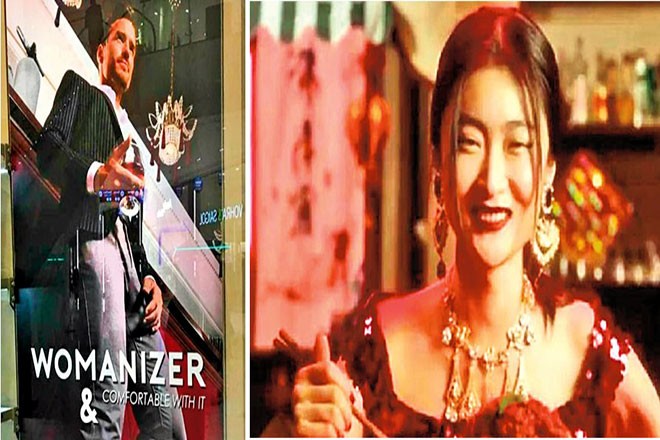

Fashion matters. It matters to the economy and to most of us personally but it is often viewed as a frivolous or vain industry and people fail to see how far-reaching it really is. Globally, the industry is valued at $3 trillion and it’s the second biggest worldwide economic activity for intensity of trade - employing over 57 million workers in developing countries, 80 per cent of whom are women. In Pakistan, the apparel sector has recently witnessed the entry of some of the biggest textile groups of the country. These groups have maximized on their opportunities by introducing separate brands, lawns and other fashion related products - further contributing to the growth of the industry. This vast, fast growing industry has the potential to initiate significant change as one of the things fashion is known to do is spread an idea very powerfully and with the all-pervasive ‘cool’ factor. Some brands nail this with their campaigns highlighting socially pertinent issues and making them known to a completely new scion of society.
In Pakistan, Ali Xeeshan is one of the designers who always attempts to push the bar with his campaigns. One of his collections this year brought Pakistan’s child marriage problem to the fore with the The Bridal Uniform campaign in collaboration with UN Women. It sent an impactful and disruptive message and also won the Cannes Lion award in the process. Generation, a brand that has also come to be known for its compelling and inclusive campaigns, recently launched a campaign called Sohni Dharti, an extension of their #StepOutside and #GreaterThanFear message(s). It aimed to highlight the repercussions of our actions towards the country and its environment, bringing forward some alarming facts.
The fact that a) the country’s tree cover has diminished from a dismal 3.3% in 1990 further to a non-existent 1.9% in 2015, b) reports by the World Health Organization stating that the Air Quality of Pakistan is amongst the worst on the planet, and c) The IMF (International Monetary Fund) ranking Pakistan as the country facing the third worst water shortage crises in the entire world! With the country’s narrative surrounding environmental consciousness more than ever before, other brands also stepped in. High street brand Sapphire came up with a brilliant eco-friendly idea, as Sapphire has introduced environment-friendly, biodegradable bags which are infused with plant seeds in them. These are some of the brands that found themselves on the right side of the debate by using their platforms to responsibly ‘give back’ and alert people on important issues.
Those who fall on the wrong end of brand messaging risk alienating entire markets. The latest and perhaps grandest Dolce & Gabbana mega gaffe has resulted in a cancelled show in Shanghai, countless models and celebrities boycotting attendance and a monumental waste of resources, effort and money. Scheduled to show in China and as part of a #DGLovesChina campaign, the brand posted three videos of a Chinese model eating Italian foods like pizza and pasta with chopsticks. The campaign was termed tasteless, racist and offensive to Chinese culture. Chinese e-commerce sites have since removed Dolce & Gabbana products amid a growing backlash against the campaign. The gaffe is not the first by Dolce & Gabbana in China, which has come under fire on social media a number of times. After the online reaction, they offered what seemed like half-hearted apologies to any offended Chinese people claiming that the posts were a result of hackers.
A similar goof up was by Bata in Pakistan, whose billboard had the tagline "Womanizer & Comfortable with it" next to a male model. When they were called out for their tone deaf and offensive advertisement they claimed it was ‘printed abroad’. The statements made by both brands came as insincere apologies.
The fashion world has grown exponentially in size and economic rewards and so is rightly under increased scrutiny. Brands that want a bigger slice of the profit pie, they need to be more culturally sensitive to the issues of the people they cater to. The industry and all brands at this point need to be in tune with their markets instead of simply putting on a front of marketing-obtained ‘connections’. Mahgul, who has her own namesake luxury brand and is Creative Director at Sapphire said, "One enters the fashion industry with the aim of becoming a known figure and those whose hard work grants them this fame have a responsibility towards the society--a responsibility to spread positivity and be respectful to each member of the society. Therefore, respecting cultures, ethnicities and emotions of people is of crucial importance that goes hand in hand in being a public figure. One not only has to be aware but also has to spread that awareness and message of inclusion, which is of utmost importance in today’s world."
On making culturally relevant statements as a fashion brand, HSY opines, "I believe it’s extremely important to be culturally sensitive as opposed to culturally relevant. As a brand, it is of utmost importance to be inclusive in one’s creativity, vision and campaign. If you’re making a statement, think about how it will impact your audience. Over the years, we have cross collaborated and paid tribute to different cultures, people and regions but we always weave our message in the fabric of our target audience because not doing so, especially as a brand with global resonance, is extremely tone deaf to the world we live in today."
Fashion isn’t ephemeral and frivolous and more people will only recognize this when those at the helm of it use it as the creative, enterprising, multifaceted industry that it really is. Fashion does matter.